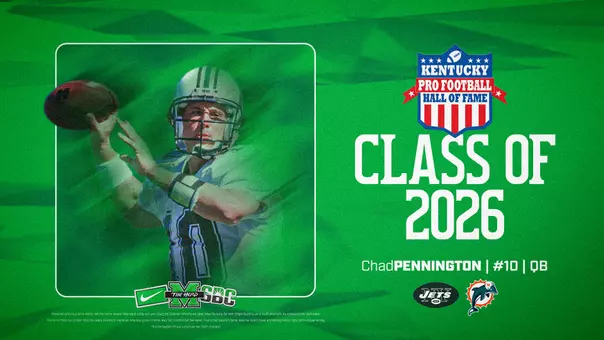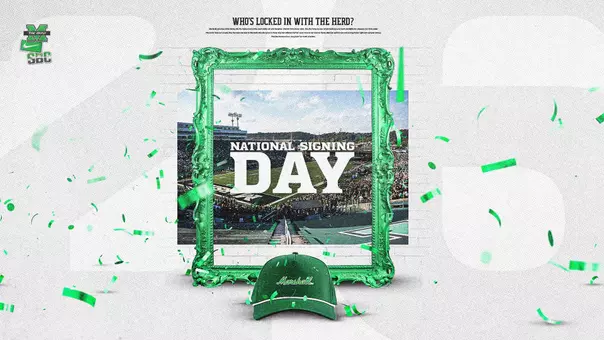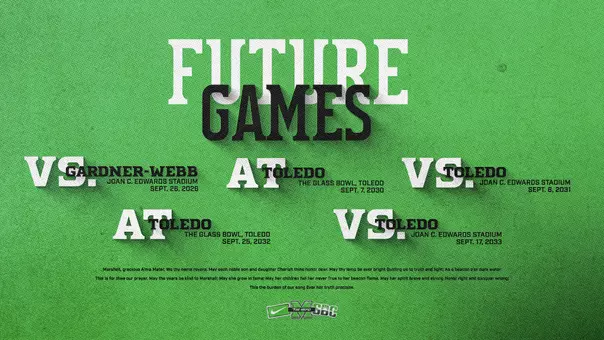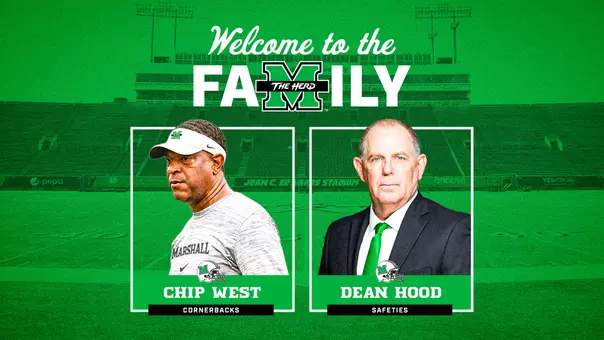Marshall University Athletics
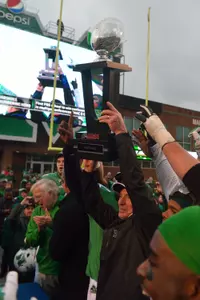
BOGACZYK: Holliday's Hire Went from Secret to Success
12/13/2014 12:00:00 AM | Football
By JACK BOGACZYK
HERDZONE.COM COLUMNIST
HUNTINGTON, W.Va. – It was five years ago today when the deal was done that has changed the profile and the personality of Marshall’s football program.
On Dec. 13, 2009 – a cold Sunday – Mike Hamrick, the Herd’s athletic director of five months, persuaded MU’s president, Dr. Stephen Kopp to ride with him to Flatwoods to interview another "Doc."
Their meeting of nearly three hours in a room at the Days Inn alongside I-79 north sealed the deal that many at the state’s two major college programs couldn’t believe – a West Virginia guy was going to coach Marshall. And four days later, John "Doc" Holliday was introduced as the Herd coach.
"Next thing you know, five years later, we’re one point in overtime, one play away from being 13-0," Hamrick said.
The Herd AD did a deal many others in his position wouldn’t, and that’s not a reference to the WVU-Marshall running vitriol. It’s because for so long, John "Doc" Holliday wasn’t considered head coaching material by so many despite nearly three decades in the profession.
Hamrick and Holliday have proven that notion quite flawed. Holliday has not only turned around Marshall fortunes, but the 2014 Conference USA Coach of the Year has a championship program that no longer is rebuilding, but reloading as it heads to the inaugural Boca Raton Bowl on Dec. 23.
The road to success for the current Herd began back in the 2002, the last season Marshall won a conference championship (Mid-American) before the one clinched a week ago. And it began at a rival C-USA school.
I’ll let Hamrick tell most of the story …
"When I was the athletic director at East Carolina, December 2002, there was a committee to hire a new football coach," Hamrick said. "And we interviewed Coach Holliday, and I recommended hiring Coach Holliday.
"Well, it got political on the committee because Doc was the associate head coach at NC State. At the end of the day, the president (then-Chancellor William Muse) told me he and the committee wanted to hire someone else (defensive coordinator John Thompson from Florida).
"Great, then obviously, I’m not the athletic director. If I’m the athletic director and I don’t get to hire the football coach … fine, so I left. That was December 2002. I left for UNLV the following August."
Fast forward seven years, to late November 2009. Hamrick decided the Herd needed a coaching change, when Mark Snyder was 22-37 in five seasons. Holliday and Hamrick had competed against each other as Mountain State high school football players – from Hurricane and Herbert Hoover, respectively. And they were now at their respective alma maters, Holliday as associate head coach to Bill Stewart at WVU, and Hamrick at Marshall as AD.
"When Mark Snyder resigned after we had a discussion and decided that was best, I obviously had a list (of potential candidates)," Hamrick said. "You always have a list, and it changes, but Doc had always been high on my list. I knew him, but I didn’t know him well.
"But Doc and my dad (longtime coach, administrator and former SSAC chief Jim Hamrick) had become good friends. My dad was then a big supporter of (WVU’s) Don Nehlen, Eddie Pastilong and Bill Stewart. He saw Doc on and off, because they were friends.
"And when the coaching job opened up here, about a day later, my dad called me. Doc never called me; he called my dad and said, ‘I really want that job,’ Mike’s at Marshall, I know you can build a program there."
Holliday – by then on Urban Meyer’s national championship staff at Florida -- had interviewed for the Herd job that Snyder got in 2004 after Bobby Pruett resigned. But Holliday pulled his name from consideration before the Snyder deal was done.
Holliday also had pursued the WVU job twice and didn’t get it – when the Mountaineers hired Rich Rodriguez after Nehlen’s retirement, and when Stewart was hired in the wee hours after a Fiesta Bowl win over Oklahoma. Holliday had "come home" for bigger money on Stewart’s staff when Snyder resigned.
"I called Doc after he talked to my dad," Hamrick said. "We had a good conversation and decided it had to stay totally between the two of us, because I couldn’t afford to offer him the job and him turn it down and he couldn’t afford to interview and not get the job … the Marshall-WVU situation. We gave each other our word. We had that agreement from Day 1.
"The only person at Marshall I ever visited with about Doc was Dr. Kopp. And the reason he’s such a great president is he’s given me the ability to run the athletic department. Obviously, he makes the final decision, but he gave me the authority to hire a football coach, to ‘go find the best coach you can get for us.’
"I talked to other candidates. We had Butch Jones come to campus. He was at Central Michigan as head coach then, now at Tennessee, a really good guy, great coach, will do great things at Tennessee. There were two or three others I visited with, here and elsewhere, and I don’t want to give other names. But Doc kept pushing through my dad."
Hamrick also got a call from a College Football Hall of Fame coach.
"Don Nehlen called me to recommend somebody else," Hamrick said, "and I listened to the recommendation and I said, ‘OK, great,’ and we talked and then I asked, ‘What about Doc Holliday? He worked for you.’
"Don said, ‘Oh my gosh, Mike, if you can hire Doc Holliday you need to do it right now.’ And I have great respect for Don Nehlen, always have, always will. I said ‘OK, great,’ but I never let on to Don that Doc was interested because we didn’t want anybody to know."
When other coaches called to recommend candidates, Hamrick listened, but he also threw out several other potential smoke-screen names for those coaches’ assessment. And among several names, he’d mention Holliday.
"One guy said, ‘Doc Holliday is probably a guy you need to take a look at, Mike, because his reputation as a recruiter is great,’" Hamrick said. "And we needed players. We didn’t have good players. We didn’t have good citizens. And we needed to change that."
Hamrick said he thought he wanted Holliday by that point, but before making an offer, he played one more card.
"I called a guy I really trusted, Gary White," Hamrick said. "He ran Buck Harless’ interests in West Virginia for a long, long time. A true Marshall fan, from Logan, ethical, well-respected and connected in the state … He was on our Board of Governors. I knew I could trust Gary.
"So, I asked Gary to call two or three of his true friends who were West Virginia supporters and ask them and then tell me what they think about Doc Holliday. And to a person, they all said he should be the head coach at WVU. I trusted Gary and I wanted to hear what he said because he was going to talk to the right people, rational people, and secretly, Don Nehlen didn’t know I was considering Doc."
Then, Hamrick called another of Holliday’s former bosses -- Meyer, at Florida. The Hamrick-Meyer connection goes back to 1988 at Illinois State, where Hamrick was the football administrator and Meyer was being hired as a part-time assistant coach. Hamrick found lodging for Meyer. The two connected against in the Mountain West Conference, when Hamrick was the AD at UNLV and Meyer was coaching at Utah.
"I called Urban, asked him what assistant coaches he could recommend," the Herd AD said. "He gave me 3-4 names and one was Doc’s. I said, ‘Hey, I know Doc,’ not giving anything away, and Urban said, ‘Doc is probably one of the best if not the best recruiter I’ve ever been around.
"So, I’d secretly gotten what I needed, but it was still like a CIA deal and we couldn’t blow this thing. I called Dr. Kopp and asked him to ride to Flatwoods with me, and it’s still got to be totally quiet. That’s why you don’t have committees. All the stuff leaks out and it hurts people, hurts careers.
"Doc was driving down from Morgantown. I told Doc I’d get a room and he should kind of sneak in and go up. It got kind of funny then. Dr. Kopp went to the restroom, I think, before going up to the room, and Doc comes in one door and I come in the other.
"Nobody there knows me or Dr. Kopp, but as Doc is getting ready to get on an elevator, a couple of maintenance men recognize him and one goes, ‘Hey, that’s Doc Holliday! Hey, Doc, what are you doing here?’ Doc tells them he’s just down (from Morgantown) to meet somebody."
At that point, Holliday had to sell himself to Kopp. Hamrick thought he knew Holliday was his man, but the president had to give his blessing.
"We’re riding back (to Huntington) and I told Dr. Kopp, ‘We can’t find anybody better; nobody else can do what I think we need to have done,’" Hamrick said. "He’s never been a coordinator, but he’s been an associate head coach. I told Dr. Kopp we could hire good coordinators; we’ll get the money. I’ll go get it. This guy will get players instantly. He’ll find players where no one else can find him.
"Dr. Kopp agreed this was the direction we need to go. I said I would raise the money to get the salary pool up so we can hire good assistant coaches. I went out and raised about $2 million – that’s the Football Enhancement Fund we started – from about 50 people to get this thing going.
"We needed funding for (players’) summer school, added an additional academic (advisor), money for improving the weight room, money for coaches’ salaries. And I explained to Doc our vision for an indoor facility. I told him whether he’d be our head coach or not, we’re going to do this."
Hamrick’s advantage was that Holliday wanted the job. Holliday had made that clear to Jim Hamrick. He wanted to be a head coach, run his own program. And Holliday was 52, which added an urgency.
"It was easy," Hamrick said. "I called Doc – no agents involved … ‘Here’s what we’re going to pay you, how long we’re committing to you and want you committing to us,’" Hamrick said. "There’s got to be a trust. Doc never came to campus.
"We got a contract to Doc, and he sent it to an attorney in Charleston, I think. Doc and I negotiated ourselves. We knew he wanted the job. Every night my dad would call and say, ‘Have you talked to Doc yet?’ I told my dad to just hold on, I’d get to him."
Holliday hasn’t just recruited to Marshall the kind of players who take a record 10 spots on the All-Conference USA first team, he’s retooled his coaching staff with quality hires after losing aides who have doubled their salaries at power-conference schools.
"It’s been a building process," Hamrick said. "Doc’s gotten better every year as a head coach. He’s come a long way as a head coach. But he’s been around good head coaches, Don, Urban, and been around lot of assistant coaches who have been good coaches.
"He has become a really, really excellent head coach. And I knew he would. He works hard, he’s a grinder and he’s tough. He’s honest, he tells you the way it is. He’s a hard-ass, but at the same time he’s compassionate and kids respond to him. Sometimes they don’t like it, but they respond because he cares.
"Doc not only can evaluate talented players. He’s able to evaluate coaches. When you’ve been in the business as long as Doc has, you can tell the good ones from the bad ones, because you make mistakes on the bad ones. And we’ve all made mistakes in hiring.
"We’ve had guys go to the Big Ten, Big 12, SEC, (former) Big East, and double their salaries. I hope we can keep some of these guys we have now. Bill Legg and Chuck Heater are two of the best coordinators in the country and they’re both here because of their relationship with Doc, and because of the financial support, because we were able to get their salaries up to where they feel good about coming to work every day."
So, what did Hamrick perhaps see in Holliday as far back as 2002 that other athletic directors may have overlooked? Holliday wasn’t a coordinator – unless you counted his longtime expertise, recruiting – but the organizational skills it takes to build a roster was among Holliday’s pluses, Hamrick said.
"What I saw in Doc was a passion," Hamrick said. "He’s a grinder. In high school, he won a state wrestling championship. He never lost a match. And I knew he had a chip on his shoulder because he’d been passed over for some other jobs, i.e. Morgantown. He wanted to be the head coach at his alma mater like I wanted to be the AD here at Marshall. And he got passed over there not once, but twice.
"He has great pride. That was one thing I saw in him, a chip on his shoulder. And I knew he wanted to prove to people that he could be a head coach and he could win … and he has."


